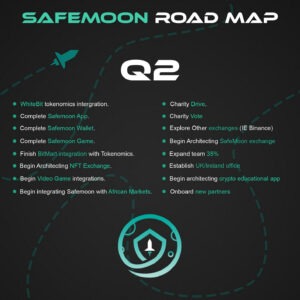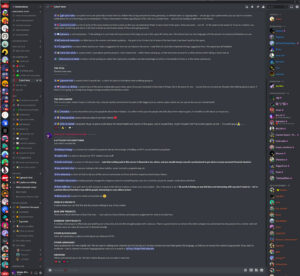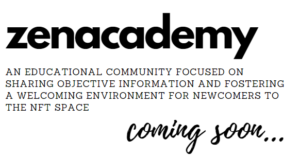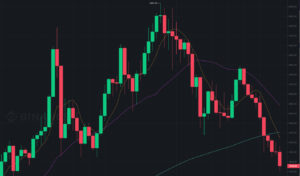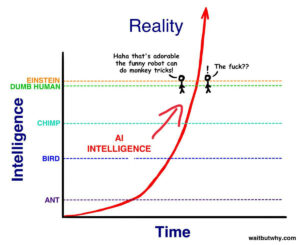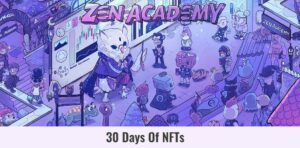8 Things I learned in 2022
2022 was a hell of a year. It started out with a bang, an explosive bull market, that waxed and waned through to an epic blow-off top when Otherside launched. Then.. a nine month bear market that we’re still in.
So many communities dissipated throughout the year. New communities were formed, but most of those fizzled out too. Some joined forces; acquisitions, mergers. Almost all struggled, in one way or another. It was hard not to — the market was atrocious (not just NFTs, but all of crypto, and everything macro). This was the first real bear market for many. Sentiment was low. Lots left the space.
Still, some communities persevered. Some survived. Some even thrived. I have long said:
The only thing you need to do to thrive in crypto, is to survive in crypto.
While obviously a bit hyperbolic, there’s a lot of truth to it. The real winners are the ones that stick around through bear markets (hey, if you’re reading this now, that’s you!) and those who learn from history.
The worst thing about going busto and exiting the space is not the money you lose, but it’s the opportunity cost of not being around for the infinite opportunities that are present during a bear.
In my recent Letter about AI I shared a quote that said the most important traits a person can have to navigate our uncertain future are adaptability and resilience. It dawns on me now that these are not exclusive to figuring out how to navigate an increasingly Artificially Intelligent future; they are also the best skills for navigating crypto, or anything with an immense amount of randomness and uncertainty involved.
Over at ZenAcademy we thrived, but not without difficulty. I learned so much last year. In no particular order, here are 8 things I learned in 2022:
Don’t let your holders mislead you
This is an interesting one. You of course want to listen to your community and holders and take in as much genuine feedback as possible. On the other hand, you do not want to adjust your plans too frequently based on what you’re seeing or hearing.
For starters, often there’s a vocal minority and the loudest voices don’t necessarily speak for the whole community. Secondly, it’s impossible to please everyone — see Impossible Expectations — any community is going to be made of up hundreds or thousands of holders who had different entry points, have different desires, goals, and expectations.
It’s very easy to be tempted into making hasty decisions because people are unhappy, but you should always take your time to think things through and ensure you stay true to your grand vision and ethos. Otherwise you end up losing the forest for the trees.
The floor is a byproduct; not the product
How many Discords have you been in where everyone is clamouring with excitement whenever the floor goes up 0.1, and chat is spammed with “why is the floor going down” when things aren’t going so rosy? If you’ve never been in a Discord like that, consider yourself lucky.
They are extremely commonplace, and rarely do they eventuate to a strong community. Not never, but rarely. This type of excitement is okay once in a blue moon but if you let the floor dictate your project, you will attract the types of holders who are only holding until the price goes up enough so they can dump and move onto the next project. Aka you’re building a ‘community’ on a house of cards, based on the Greater Fool Theory, and it’s never going to last.
Make decisions to make your holders happy, to improve their lives, to build towards a greater goal/vision, to solve real problems, and to build something meaningful. If you do this, the floor price should eventually go up, long term. If you make decisions to try and pump the price in the short term, you’re cutting your long term legs off.
Take frequent inspiration from others
It’s really easy to stay siloed within your own community and neglect to look at what other projects are doing. This is a mistake. Of course you should spend a tonne of time within your community, listening to them, working with your team, building within your own ecosystem — but you miss out on so much if you’re not keeping one eye on the other successful projects in the space.
There are a bunch of ways to do this, but my favourite is to simply become a community member of other projects. Buy a penguin, buy a y00t, buy a seal, buy a bean, buy a frog, buy a mutant, buy a birb (this is a funny sentence). Then join their Discord servers and spend some time chatting with the community & seeing how things operate from the inside. Follow people on Twitter, jump on Spaces you don’t normally jump on. Listen to podcasts you might not usually listen to.
It’s tremendously eye-opening and i’m frequently surprised by the lack of founders spreading their wings and joining other communities.
Experiment. Relentlessly.
It’s not a coincidence that so many of the companies behind NFT projects end with labs. Larva Labs, Yuga Labs, Dust Labs, ZenLabs. We’re ALL experimenting here. This is new ground, new technology, and it’s changing all the time. If you’re not taking risks and trying things, you’re always going to be a step behind.
You don’t have to take crazy risks. Just.. try a lot of things. Some will work, some won’t. Either way, you’ll be richer for the experience.
KISS: Keep It Simple, Stupid.
I’ve been part of a LOT of projects and communities over the years. This space is ALREADY complex as all hell. You’re generally not doing yourself any favours by amplifying the complexity.
Consider that most people have families, full time jobs, other obligations, etc. If you’re ostrasizing all but the most hardcore fanatics from your ecosystem, you’re shooting yourself in the foot.
Having a few collections is fine/fun/great, adding a sprinkle of gamification is fine/fun/great, but be weary of overcomplicating things lest people throw up their hands and bow out of your ecosystem.
Minimize external dependencies
Perhaps a better title would be “minimize centralized external dependencies”.
The value of a Bored Ape has always been largely driven by Yuga Labs executing on some sort of road map. The value of an Autoglyph is dependent on very little, other than the Ethereum Blockchain continuing to exist and Generative Art as a medium continuing to be relevant.
Every token exists on a spectrum. Punks are largely independent of any central entity. Squiggles are symbolic of the generative art movement, but they’re also inexorably connected to Art Blocks and Snowfro. CloneX are heavily dependant on RTFKT and Nike.
Pudgy Penguins are my favourite example. This is a project that was dependant on a centralized entity (the team), but when they effectively rugged and abandoned the project, the community persevered. They proved that there was value beyond the team, and that’s incredibly powerful. When Luca Netz bought the project and took it over, yes it was injecting a new centralized entity into the equation, but the project and community had already proven they could exist/thrive without any roadmap or promises.
I think a worthy goal for every project should be to trend towards decentralization and to be in a place where whatever has been created will continue to thrive and flourish with or without anyone “doing something”. Of course many (most/all) projects start out extremely centralized and I think that’s totally fine and it’s very sensible to put a lot of eggs in a small basket and bet on a team or an idea, but eventually there needs to be a plan or migration to ensure longevity.
One of the beautiful things about Art is that it inherently has very few external dependencies.
Art is the utility.
Attention is everything
We live in an attention economy, there is zero doubt about that. The success of a project, of a token, of a company, of an idea, it lives and dies based on the amount of attention that can be generated.
There are an infinite number of ways to generate attention. It can be community-generated, where a creator releases something that people absolutely love and it goes viral and is self-fulfilling. That’s the dream. Most of the time, people will have to actively (and consistently) work to be front of mind in the market.
This is where marketing enters the fray. Marketing often has a negative connotation, and I myself used to shudder when I heard the word. Isn’t marketing just charlatans using trickery to fool us into buying useless things, to line their own pockets?
That’s how some people use marketing. It’s sad, it’s unfortunate, but it’s life.
Something I heard a month or so back has always stuck in my head: good marketing is about helping people. Plain and simple. Ever since hearing that, my view has changed. If you believe in your product, your service, your token, your community, whatever it is you want to market — then there is nothing wrong about trying to spread the word and get more eyes on it.
There are ethical and less ethical ways to go about this, and I leave that up to you to figure out. Everyone has a different moral compass.
At the end of the day, the more attention you can garner, the more likely it is for your project to succeed. “All publicity is good publicity” and all that. Remember when y00ts was being fudded into the ground? They got so much attention, and so many people who never heard about y00ts found about the project then, and it has been on their radars ever since.
Do what you have to do to win the attention war, or at least be a worthy participant in the battles.
Be in the trenches
Almost all of the most successful projects of 2022 had a singular Founder who carried the projects on their backs, who rallied the troops, who led the project. Luca Netz w/ Pudgy Penguins. Alex Lin w/ Valhalla. Ray (9gagceo) w/ Memeland. Frank w/ DeGods and y00ts, Wab w/ Sappy Seals.
One thing they all have in common is how much time they spend engaging with not only their own community but with the community at large. Hanging out in Discord, chatting on Twitter Spaces, tweeting, doing podcasts, attending IRL events, you name it.
This is not to say that you can’t find success with a more hands off approach (most of the 2021 projects took this route), but it seems that more and more people are resonating with founders that are in the trenches degenning it up with the rest of us.
I’ve learned a lot, and I am continuing to learn every day. I don’t pretend to know all of the answers, or even most of them. The best piece of advice I can give is to never stop learning, and especially to never think that you need to.
There is, to my way of thinking, nothing more noble than an open mind.
I hope you found this Letter helpful – if you have any thoughts or questions, please comment below and/or hop into the ZenAcademy Discord where I am always around and happy to chat 🙂
Disclaimer: The content covered in this newsletter is not to be considered as investment advice. I’m not a financial adviser. These are only my own opinions and ideas. You should always consult with a professional/licensed financial adviser before trading or investing in any cryptocurrency related product.
Additional Disclaimer: I own a lot of the projects mentioned in this post and my incentives are aligned with the projects doing well. I am not endorsing or recommending anyone to buy into these projects at their current prices, or at any prices. Please do your own research before making any financial decisions.
- SEO Powered Content & PR Distribution. Get Amplified Today.
- PlatoAiStream. Web3 Data Intelligence. Knowledge Amplified. Access Here.
- Minting the Future w Adryenn Ashley. Access Here.
- Buy and Sell Shares in PRE-IPO Companies with PREIPO®. Access Here.
- Source: https://zeneca33.substack.com/p/letter-34-on-community-building-floor
- :has
- :is
- :not
- :where
- $UP
- 1
- 10
- 12
- 14
- 15%
- 20
- 2021
- 2022
- 24
- 7
- 72
- 9
- a
- About
- absolutely
- acquisitions
- actively
- adding
- advice
- aligned
- All
- already
- also
- always
- am
- amount
- amplifying
- an
- and
- Another
- answers
- any
- anyone
- anything
- APE
- approach
- ARE
- around
- Art
- Art Blocks
- AS
- At
- attending
- attention
- auto
- avatar
- back
- based
- basket
- battles
- BE
- Bear
- Bear Market
- bear markets
- beautiful
- because
- become
- been
- before
- behind
- being
- believe
- below
- BEST
- Bet
- Better
- Beyond
- Bit
- blockchain
- Blocks
- blow-off
- Blue
- body
- Bored
- BORED APE
- bought
- build
- Building
- bull
- Bull Market
- Bunch
- but
- buy
- Buying
- by
- CAN
- capable
- Cards
- central
- central entity
- centralized
- changed
- changing
- chatting
- coincidence
- collections
- comment
- Common
- Communities
- community
- community building
- Companies
- company
- Compass
- complex
- complexity
- connected
- Consider
- considered
- content
- continue
- continuing
- Cost
- could
- course
- covered
- crazy
- created
- creator
- crypto
- cryptocurrency
- Current
- cutting
- day
- Decentralization
- decisions
- DeGods
- dependent
- different
- Difficulty
- discord
- do
- doing
- Dont
- doubt
- dream
- driven
- dump
- during
- Dust
- dust labs
- easy
- economy
- ecosystem
- effectively
- Eggs
- either
- end
- Endorsing
- engaging
- enough
- ensure
- Enters
- entity
- entry
- EPIC
- etc
- Ether (ETH)
- ethereum
- Ethereum blockchain
- ethical
- Ethos
- Even
- events
- eventually
- EVER
- Every
- every day
- everyone
- everything
- example
- Excitement
- Exclusive
- executing
- exist
- exists
- Exiting
- expectations
- experience
- external
- extremely
- eye
- Eyes
- families
- fanatics
- feedback
- few
- Figure
- financial
- Find
- fine
- First
- Floor
- FLOOR PRICE
- flourish
- follow
- Foot
- For
- Forces
- forest
- formed
- found
- founder
- founders
- frequent
- frequently
- from
- front
- full
- funny
- future
- gamification
- generally
- generate
- generated
- generative
- genuine
- get
- Give
- Go
- goal
- Goals
- Goes
- going
- good
- greater
- Ground
- had
- hand
- Hands
- happy
- Hard
- hardcore
- Have
- head
- heard
- hearing
- helpful
- helping
- here
- history
- holders
- holding
- hope
- House
- How
- How To
- HTTPS
- Hundreds
- i
- idea
- ideas
- if
- immense
- important
- impossible
- improve
- improving
- in
- Incentives
- increasingly
- incredibly
- independent
- Inspiration
- Intelligent
- interesting
- into
- investing
- investment
- involved
- irl
- IT
- Jan
- Jobs
- join
- joined
- joining
- jpg
- jump
- just
- Keep
- keeping
- Know
- Labs
- Lack
- large
- largely
- Larva
- Larva Labs
- Last
- Last Year
- launched
- LEARN
- learned
- learning
- least
- Leave
- Led
- left
- legs
- less
- letter
- Life
- like
- likely
- Line
- Listening
- little
- live
- Lives
- Long
- longevity
- Look
- lose
- losing
- Lot
- love
- Low
- Macro
- made
- make
- Making
- many
- many people
- map
- Market
- Marketing
- Markets
- meaningful
- medium
- member
- mentioned
- might
- migration
- mind
- minority
- mistake
- money
- Month
- moral
- more
- most
- move
- movement
- much
- mutual
- name
- Navigate
- navigating
- necessarily
- Need
- needs
- negative
- never
- New
- Newsletter
- next
- NFT
- NFT projects
- NFTs
- NIKE
- no
- Noble
- normally
- nothing
- now
- number
- obligations
- of
- off
- often
- Okay
- on
- ONE
- ones
- only
- open
- operate
- Opinions
- opportunities
- Opportunity
- or
- order
- Other
- Otherside
- otherwise
- our
- out
- over
- own
- part
- particular
- Penguins
- People
- person
- piece
- Place
- Plain
- plan
- plans
- plato
- Plato AiStream
- Plato Data Intelligence
- PlatoAiCast
- PlatoData
- please
- pockets
- Podcasts
- points
- possible
- Post
- powerful
- present
- price
- Prices
- problems
- process
- Product
- project
- projects
- promises
- proved
- proven
- publicity
- Pudgy
- Pudgy Penguins
- pump
- punks
- put
- Questions
- randomness
- RE
- Reading
- real
- really
- recommending
- related
- Releases
- relevant
- remember
- resilience
- REST
- risks
- road
- roadmap
- Rosy
- round
- Route
- Said
- say
- see
- seeing
- seems
- sentence
- sentiment
- service
- shared
- shooting
- Short
- should
- Simple
- simply
- since
- singular
- skills
- small
- Snowfro
- So
- SOLVE
- some
- something
- Space
- spaces
- speak
- Spectrum
- spend
- spread
- Spreading
- start
- started
- starters
- stay
- Step
- Stick
- Still
- Stop
- strong
- succeed
- success
- successful
- surprised
- survive
- Survived
- Take
- taking
- team
- Technology
- than
- that
- The
- The Projects
- their
- Them
- then
- There.
- These
- they
- thing
- things
- think
- Thinking
- this
- those
- thousands
- Thrive
- Through
- throughout
- time
- Title
- to
- token
- too
- took
- top
- TOTALLY
- towards
- Trading
- Trees
- tremendously
- Trend
- tried
- true
- truth
- tweet
- Twitter Spaces
- type
- types
- Uncertain
- Uncertainty
- unfortunate
- until
- us
- use
- used
- using
- usually
- utility
- value
- very
- View
- vision
- VOICES
- want
- war
- was
- Way..
- ways
- we
- Web3
- WELL
- were
- What
- when
- whenever
- WHO
- whole
- Wikipedia
- will
- win
- winners
- with
- within
- without
- Word
- Work
- working
- Worst
- would
- Wrong
- y00ts
- year
- years
- you
- Your
- yourself
- Yuga
- Yuga Labs
- zero





